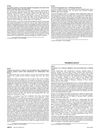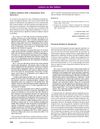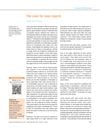 33 citations,
August 1973 in “American Heart Journal”
33 citations,
August 1973 in “American Heart Journal” Propranolol can cause reversible hair loss.
 25 citations,
December 1974 in “Clinical Pharmacology & Therapeutics”
25 citations,
December 1974 in “Clinical Pharmacology & Therapeutics” Propranolol affects heart rate and renin levels in minoxidil-treated patients.
 16 citations,
December 2011 in “Actas Dermo-Sifiliográficas”
16 citations,
December 2011 in “Actas Dermo-Sifiliográficas” Propranolol is effective and safe for treating infantile hemangioma, but more research is needed for dosing and monitoring guidelines.
 15 citations,
November 1994 in “International Journal of Dermatology”
15 citations,
November 1994 in “International Journal of Dermatology” Propranolol combined with injections caused skin changes in guinea pigs but didn't fully mimic psoriasis.
 11 citations,
January 2020 in “Micro and Nanosystems”
11 citations,
January 2020 in “Micro and Nanosystems” The new gel improves skin delivery of a drug, potentially reducing dose frequency and side effects.
 55 citations,
October 1975 in “Circulation”
55 citations,
October 1975 in “Circulation” Minoxidil, propranolol, and furosemide effectively control severe hypertension, but may cause sodium retention.
 April 2017 in “Journal of Investigative Dermatology”
April 2017 in “Journal of Investigative Dermatology” Sirolimus and propranolol may reduce abnormal cell growth and improve lymphatic malformations in children.
 February 2013 in “Journal of The American Academy of Dermatology”
February 2013 in “Journal of The American Academy of Dermatology” Oral propranolol successfully treated a baby's skin growth and ulceration linked to PELVIS syndrome.
 June 1982 in “Reactions (Auckland)”
June 1982 in “Reactions (Auckland)” Metoprolol and propranolol may cause hair loss.
 102 citations,
September 1977 in “The Lancet”
102 citations,
September 1977 in “The Lancet” Minoxidil with propranolol and diuretics lowers blood pressure but causes fluid retention and hair growth.
 May 2010 in “Dermatologic Clinics”
May 2010 in “Dermatologic Clinics” The document concludes that new treatments for skin conditions are complex but effective, including spironolactone for female hair loss and propranolol for infantile hemangiomas.
 54 citations,
September 2012 in “Dermatologic Clinics”
54 citations,
September 2012 in “Dermatologic Clinics” Some medications can cause hair loss, but stopping the drug usually leads to recovery within 3 months.
 36 citations,
March 1987 in “Pediatrics”
36 citations,
March 1987 in “Pediatrics” Minoxidil use during pregnancy can cause excessive hair growth and multiple birth defects in the baby.
 30 citations,
May 1991 in “Psychosomatics”
30 citations,
May 1991 in “Psychosomatics” Some psychiatric medications can cause reversible hair loss.
 16 citations,
March 2006 in “The American journal of psychiatry”
16 citations,
March 2006 in “The American journal of psychiatry” Lowering the dose of ziprasidone can cause sudden restlessness and urge to move in patients.
 16 citations,
July 1996 in “Dermatologic Clinics”
16 citations,
July 1996 in “Dermatologic Clinics” Some psychiatric drugs can cause skin problems, but serious reactions are rare.
8 citations,
January 2016 in “Cells tissues organs” Norepinephrine helps skin cells grow, which is important for hair growth.
 8 citations,
May 2010 in “Dermatologic clinics”
8 citations,
May 2010 in “Dermatologic clinics” New treatments for skin conditions in children include a preferred drug for birthmark reduction, proactive creams for eczema and vitiligo, a safe psoriasis medication, and special tissues and socks for eczema and fungal infections.
 5 citations,
December 1981 in “PubMed”
5 citations,
December 1981 in “PubMed” Metoprolol, a blood pressure medication, was linked to reversible hair loss.
 4 citations,
January 2014 in “Indian Dermatology Online Journal”
4 citations,
January 2014 in “Indian Dermatology Online Journal” Case reports are important in medical science for discovering drugs and identifying rare conditions, despite their limitations.
 3 citations,
February 1985 in “PubMed”
3 citations,
February 1985 in “PubMed” Stopping the beta-blocker nadolol led to quick hair regrowth and improved scalp condition.
 1 citations,
January 2023 in “Journal of pharmaceutical and biological sciences”
1 citations,
January 2023 in “Journal of pharmaceutical and biological sciences” Ethosomes are a promising way to deliver drugs through the skin.
1 citations,
January 2022 Autoimmune Polyendocrine Syndromes involve specific combinations of endocrine and non-endocrine autoimmune diseases.
 1 citations,
January 1987 in “Journal of The American Academy of Dermatology”
1 citations,
January 1987 in “Journal of The American Academy of Dermatology” The patient's hair loss was likely not caused by beta blockers but possibly by stress or other factors.
 January 2022 in “Journal of Skin and Stem Cell”
January 2022 in “Journal of Skin and Stem Cell” Trichodynia is a painful scalp condition needing targeted treatments beyond symptom management.
Autoimmune Polyendocrine Syndromes involve specific combinations of autoimmune diseases.
December 2017 in “Annales de dermatologie et de vénéréologie” In 2017, pediatric dermatology advanced with new treatments and insights into various skin conditions in children.
 July 1987 in “Reactions (Auckland)”
July 1987 in “Reactions (Auckland)” Oral minoxidil may slow male pattern baldness and cause body hair growth, but hair loss can happen after stopping it.
 36 citations,
July 1977 in “The Journal of Pediatrics”
36 citations,
July 1977 in “The Journal of Pediatrics” Minoxidil helps lower blood pressure in kids with severe hypertension, but may cause temporary excessive hair growth.
 19 citations,
May 1979 in “Archives of internal medicine”
19 citations,
May 1979 in “Archives of internal medicine” Minoxidil effectively lowers blood pressure and initially increases plasma renin activity without raising aldosterone levels.


























